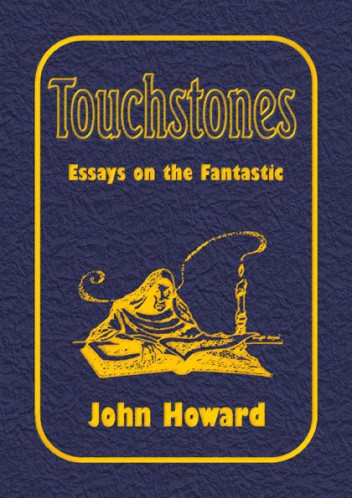
If, dear reader, you are at all like me, you are a bit of a dipper. Nothing pervy implied, I just mean that you may be one who dips into collections of stories, reference works, biographies, dictionaries, maps, stuff in general. A collection of essays on an interesting topic is especially useful to the dipper as it offers the chance to discover new interests and re-acquaint oneself with old friends. This is certainly the case with Touchstones, by John Howard, published this summer by Alchemy Press. I recently received a pdf of this volume and have been perusing it on the old Kindle.
The book collects essays by the author, an erudite and enthusiastic scholar of genre fiction. Topics range from Utopian novels to horror by way of fantasy and sf. The authors tackled range from the well-known - there's a lot of really good stuff on Fritz Leiber here - to the very obscure. In all there are twenty-two essays, every one of 'em readable and informative thanks to Howard's winning combination of clarity, enthusiasm, and erudition. All I can really do here is mention a few highlights and point out that every individual reader will have his/her own favourites, based on their reading preferences.
Leiber, first, and 'In Smoke and Soot I Will Worship'. This takes a close look at Leiber's classic 'Smoke Ghost', and puts it in the context of the author's creative development from Lovecraft disciple to distinctive genre voice. Other essays consider Leiber's novel Our Lady of Darkness and his story 'The Death of Princes', also with a more general survey of his ghostly fiction. There is also a fascinating piece on Harry O. Fischer, Leiber's friend and collaborator who helped create the parallel world of Lankhmar.
(Incidentally, if you want to hear recordings of Leiber reading his work and discussing horror, fantasy etc, there are some good links here. Scrolls of Lankhmar is a darn good site.)
Another genre titan that Howard focuses on is Arthur Machen. I can't claim to have read enough of Machen's work to fully grasp his mystical and (not entirely orthodox) Christian world-view. But Howard argues persuasively (in 'A World of Great Majesty: The Pattern in Arthur Machen’s Carpet') that the author 'set himself up as a spokesman for Miracle and Mystery'. This is an aspect of Machen's work I find hard to take, as it runs parallel to a contempt for science that, as Howard notes, was needless given the awe-inspiring universe that astronomy reveals.
 |
| August & April Derleth |
Carl Jacobi, an Arkham House regular, was the subject of an essay in ST#4, reproduced here. Jacobi did himself no favours by interlarding his rather good supernatural stories with some poor science fiction. But, as Howard observes, his best stories offer 'a sense of place and an atmosphere of doom and weirdness'. Perhaps someone will publish his weird fiction in paperback or a decent ebook.
Even more obscure than Jacobi is William F. Sloane, an American publisher who turned his hand to fiction in the later Thirties. Howard's essay is on The Edge of Running Water, Sloane's second (and last) novel. It's about a scientist who seeks 'forbidden knowledge' - and finds it. Like Sloane's first novel, To Walk the Night, it's a neglected classic that offers an object lesson in storytelling and has some excellent ideas.
Perhaps the least-known author and work considered by Howard, though is Gunter Eich, whose radio play Traume (dreams) baffled and outraged listeners in post-war Germany. It's the mark of a good critic that, in discussing a work you've near heard of, he gives you a clear sense of what it's about, and Howard comes through here. As a lover of radio drama I was fascinated.
Those Utopian novels I mentioned earlier underline this point. Of the four books Howard mentions I've only read one - M.P. Shiel's The Lord of the Sea. But he offers concise summaries of works by Baron Corvo, R.H. Benson, and Nevile Shute, and gives a clear idea of their strengths and weaknesses.
Another gift possessed by the good essayist is that he can make you think again about familiar authors. Thus in reading 'Old England, New England: M.R. James, Mary Wilkins Freeman, and Sarah Orne Jewett' I realised that there are some intriguing parallels between the American ghost story tradition and the so-called 'James gang'.
I could go on, but this is not supposed by an essay about essays. Suffice to say that Touchstones has something for everyone who is interested in the highways and byways of weird fiction.




No comments:
Post a Comment